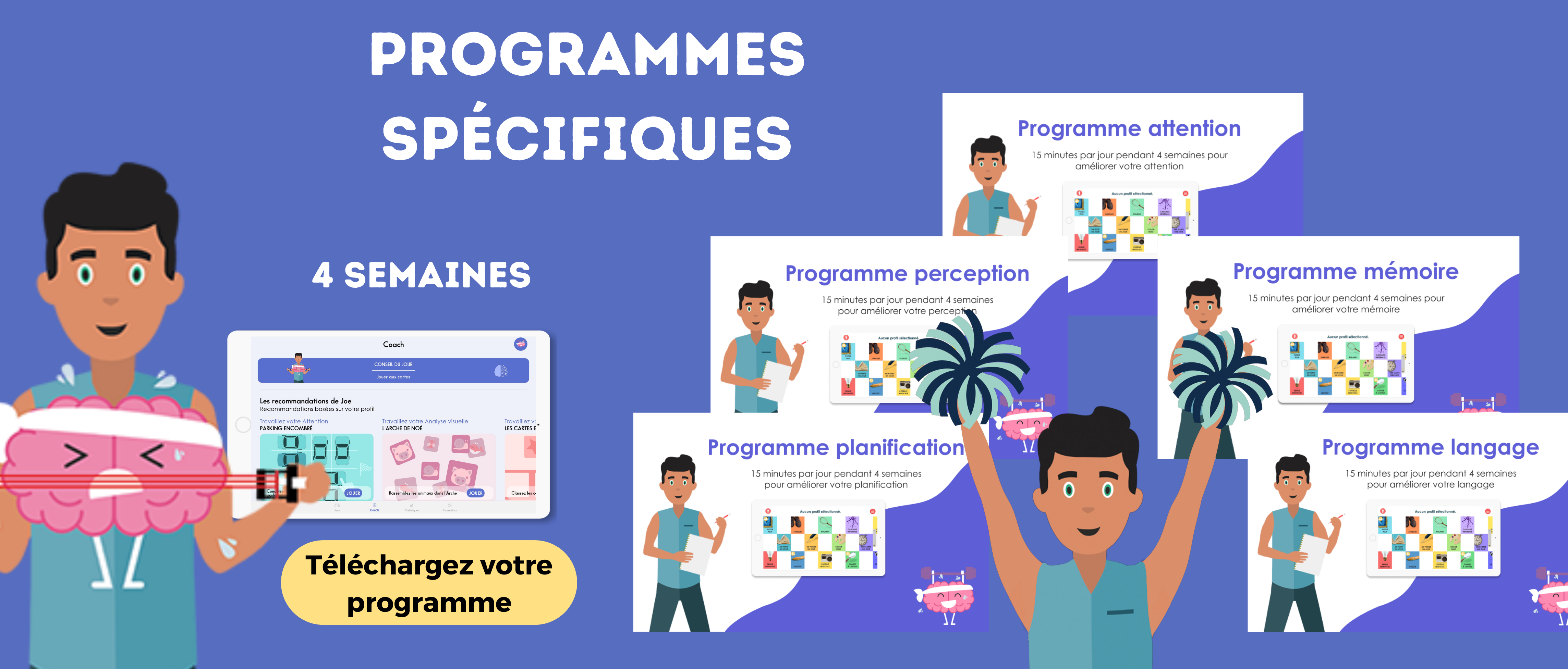Work
its EPISODICMEMORY


Preserving episodic memory
Strengthen the ability to recall personal events and experiences

Reinforce retention of personal memories
Improve ability to memorize specific events and their context

Applications in everyday life
helps to remember important details of past events

Episodic memory is a form of memory specially dedicated to precise recollections of past events: a wedding day, a school outing, a significant event in one’s life, an emotional shock. It encompasses not only the memory of the events themselves, but also their temporal context (date), spatial context (place) and emotional context (emotions felt during the event).
What is episodic memory?
Episodic memory deals with facts or events from different periods of a person’s past life, and stores event-related characteristics for retrieval. The process of recalling events is a conscious one.
Episodic memory records all biographical events. It is subject to the vicissitudes of interference, forgetting, subjectivity, contextual variations, affective tone and frequency.
Information retrieval in episodic memory is based on information from the present situation: recall, cue, recognition.
When we remember the past, when we reactivate a memory, we have a particular mental experience: we see ourselves as actors in the events, aware of our own identity. It’s as if you’re replaying the film with a “subjective camera”.
Another feature is the subjective sensation of time: episodic memory enables us to mentally travel in time, from the present to the past, and even into the future.
Episodic memory disorders
Episodic memory disorders may be due to illness or to under-stimulation of this skill. In general, the difficulty lies in recording information and retrieving memories linked to a specific experience.
A symptom may be that a memory is blurred, and over time we have less and less detail linked to it. Older people generally have poorer episodic memory than younger people. One reason for this is that slow-phase sleep, which is beneficial for the consolidation of episodic memory, is shorter in the elderly.
Pathologies that can lead to episodic memory disorders include dementia, Alzheimer’s, stroke or traumatic brain injury.
Exercises to train and improve episodic memory
To train your episodic memory, you need to try and create associations. If you associate a memory with something concrete, you’ll remember it better.
Creating associations can help in the present moment to improve memory capacity, and in the next phase when it’s time to remember.
Our games for working episodic memory
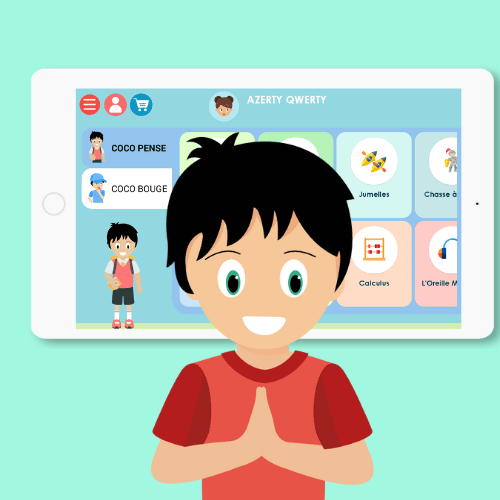
COCO THINKS and COCO MOVES
- Le poème perdu
- Musical ear
- Brainstorming
- Coco Cuisine
- One card one date
- Quizzle
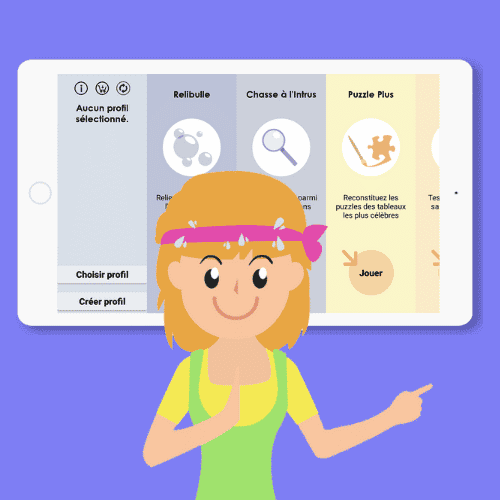
SCARLETT
- Le poème perdu
- Mamie Cuisine
- One Card, One Date
- Musical ear
- Brainstorming
- Un texte un jour / A poem for a day
- Around the world
- Quizzle

CLINT
- Le poème perdu
- Mamie Cuisine
- One card, one date
- Musical ear
- Brainstorming
- Un texte un jour / A poem for a day
- Around the world
- Quizzle
1. Memorization of time sequences
This memory enables us to recall the exact course of an event. What we did before, during and after. It’s very important for coherent, logical memories.
A time marker can also help you remember the moment better. This can be a specific time (a program at 8pm), a time of day (it was morning because I was having breakfast), a time of year (it was summer) or a year in general (I was in 3rd grade).
A Card A Date
In this game, you have to put the events in chronological order.
Of course, here we’re not always talking about events we’ve experienced personally, but we can associate memories with them. For example, we can remember the year Neil Armstrong walked on the moon by recalling what we were doing when they talked about it on TV.
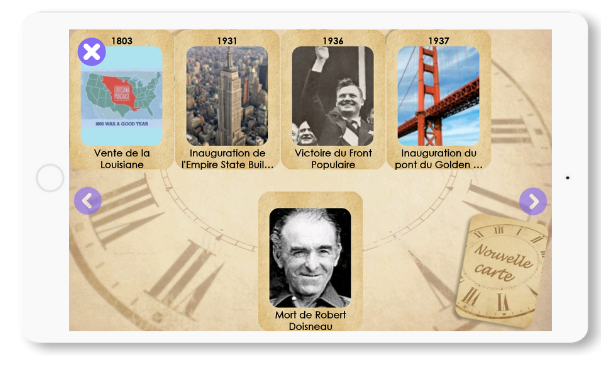
2. Memorization of spatial knowledge
When we remember something, we also remember where it happened.
This skill also helps with orientation, since spatial memories can help us find our way more easily. The ability to remember where something happened is very useful for having clearer memories.
Around the world
In this game, the player positions a country on a map.
To find the right placement, we can use our general knowledge, but also our memory. Indeed, if you’ve already visited a country, it’s easier to remember where it is on a map.
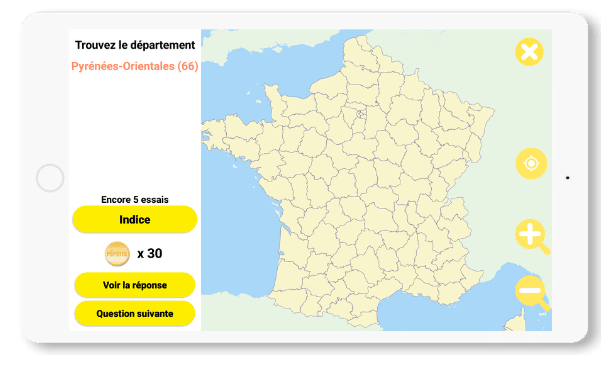
3. Representation of personal memories
Semantic memory enables us to recall memories linked to our personal experience.
Indeed, when we think of something from our past, we create a mental image of that event. This representation enables us to relive the memory in a more powerful way.
Mamie Cuisine
In this game, the player has to find the ingredients of a recipe.
When we prepare a recipe we’ve already made, we often think back to the last time we cooked it, to remember the ingredients, for example.
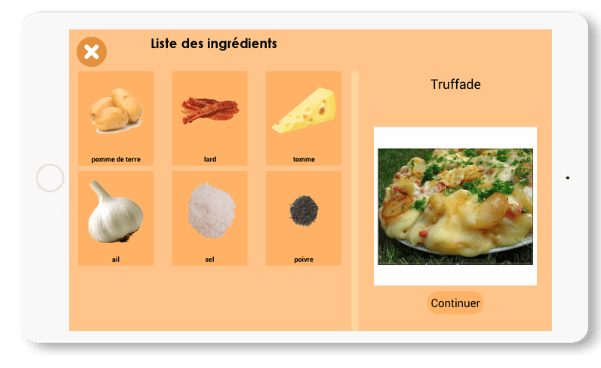
4. Integration of different sensory memories
An experience is never linked to just one sense; on the contrary, our 5 senses are always active.
When we think of a memory, we activate all our sensory memories. We remember sounds, smells, colors and so on. It’s this integration that makes the memory real.
Musical ear
In this game you have to listen to a sound and recognize it.
We mainly use hearing, but once we’ve understood what the object is, we also imagine its shape, we create a mental image of this object, and we can also remember the sensation we may have when using this object.
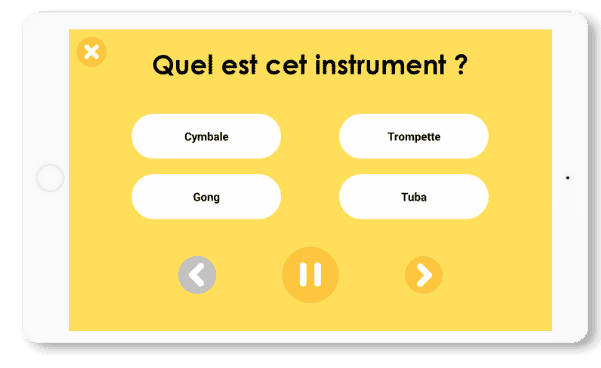
Do you want to improve your episodic memory?
Our games have the following 3 impacts:
-
Stimulate episodic memory in everyday life: Our games are designed to help reinforce the ability to recall past events by reconstructing contextual elements, as in “Mamie Cuisine”, where you have to remember the ingredients of a recipe.
-
Reinforce retention of personal memories: Games help to memorize events and their context. For example, in “Une carte une date”, the aim is to put events in chronological order, linking them to our own history to place them in time.
-
Applications in everyday life: Working on episodic memory enables you to remember key moments in your daily life, such as appointments, important conversations or personal events, thus improving time management and social interaction.
Discover our attention training programs with our coaches!

COCO THINKS and COCO MOVES

SCARLETT

CLINT
Follow a training program for 4 weeks
ATTENTION PROGRAM
For 4 weeks, follow our program to work on attention by playing our specially selected games for 15 minutes a day.
MEMORY PROGRAM
For 4 weeks, follow our program to work the memory by playing our specially selected games for 15 minutes a day.
LANGUAGE PROGRAM
For 4 weeks, follow our program to work on language by playing our specially selected games for 15 minutes a day.
PLANNING PROGRAM
For 4 weeks, follow our program to work on your planning by playing our specially selected games for 15 minutes a day.
PERCEPTION PROGRAM
During 4 weeks follow our program to work on perception by playing our specially selected games for 15 minutes a day.
Complementary exercises at home to train your episodic memory
Reviewing past events
-
Reliving a memory aloud: Choose a significant event from your past and tell it to someone. Try to remember details such as the location, the people present and the emotions felt. This activates your episodic memory by calling up the context of the memory.
-
Write a memory diary: Write down a significant event every day, no matter how small. This helps to record details and reinforce the ability to remember specific moments.
Use visual cues
-
-
Create a “mind map” of memories: Draw a diagram or mind map of the key events in your life. For example, draw a timeline with key moments, and associate images or keywords with each event. This helps you visualize your memories.
-
Review photos or videos: Look at old photos or videos and try to remember the context of each image: what happened just before or after the photo. This reactivates memories associated with these events.
-
Organize events in chronological order
-
-
Sort events by date: Make a list of important events in your life and try to organize them in chronological order. This reinforces the ability to structure and memorize memories in a temporal sequence.
-
Linking events to temporal cues: Use cues such as seasons or dates of the year to remind you of specific events. For example, associate a summer event with a typical summer activity, such as a vacation or vacation.
-
Telling a personal story
-
Reconstruct a detailed event: Choose a significant memory and recount it in detail, focusing on the actions, people involved and context. The more you recount the event, the stronger the links in your episodic memory.
- Make links with other memories: When narrating, try to link the event to other similar or different memories. This helps you make connections between your past experiences, which strengthens episodic memory.
Practice progressive recall
-
-
-
Recall an event step by step: Choose a significant event, then begin to relive it in detail, focusing first on a single aspect (the place, the people) and gradually expanding. This stimulates the reactivation of memories, helping you to recall every detail.
-
Play an episodic memory game: Ask someone to ask you questions about past events, then try to answer without hesitation. This improves your ability to retrieve precise information from your episodic memory.
-
-
Use auditory cues
-
-
Listen to recordings of past conversations: If you have audio recordings of important moments, listen to them again and try to remember the details of these moments, such as the environment, emotions, or the actions of others.
-
Listen to music associated with memories: Listen to songs or music you used to listen to at the time of a particular event. This can revive specific memories and associate them with specific emotions and moments.
-
Create contextual associations
-
-
Associating places with memories: Go back to a place that was important to you (for example, your school or an old house) and try to remember several events that happened there.
-
Visualize past scenes: Close your eyes and imagine a particular scene from your past. Concentrate on details such as sounds, people, objects and emotions felt at the time.
-
Participate in group activities
-
-
-
-
Sharing memories with others: Get together with friends or relatives and share common memories. This stimulates episodic memory, helping you to reconstruct events with the help of collective memory.
-
Group memory games: Organize games where you have to recall events shared with other people, such as activities or trips taken together. This activates episodic memory in a social way.
-
-
-
Summarizing events on a life card
-
-
-
Draw a map of your life: Draw a “life map” including major events at different stages of your life. Use symbols or drawings to represent these events, helping you to better visualize and remember key moments.
-
Use journals and physical mementos: If you have objects or physical mementos associated with events (cards, tickets, objects), gather them together to examine them and revive related memories.
-
-



